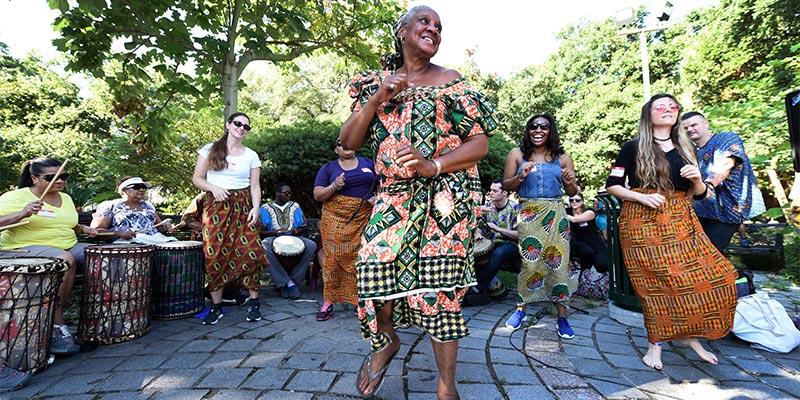Music Rising strikes a chord with local teachers
Class was in session for teachers from Homer A. Plessy Community School, as Congo Square scholar Freddi Williams Evans led the group of educators in a thunderous clapping rhythm within the Louisiana Endowment for the Humanities building on Lafayette Street in downtown New Orleans.
Evans’ hands-on exploration of the bamboula beat — the backbone rhythm behind much of New Orleans’ archetypal music — was part of the second annual Music Rising Educator Institute, a professional development program for local teachers hosted by the New Orleans Center for the Gulf South at Tulane University and the Louisiana Endowment for the Humanities.
Music Rising at Tulane is a partnership between Tulane University and the Music Rising Foundation, an organization co-founded by U2’s The Edge and producer Bob Ezrin.
“This is ground zero of American musical culture, and our music is continually evolving.”
Edward Anderson, educator institute co-director
“I’m thrilled to be here,” said Rebecca Snedeker, executive director for the New Orleans Center for the Gulf South. “Today marks the beginning of a year-long pilot partnership between the Music Rising at Tulane program and the Homer A. Plessy School.”
Snedeker said that Sonya Robinson, director of educator engagement, and Edward Anderson, educator institute co-director, have empowered Plessy teachers and staff along with musicians, dancers and scholars, to bring the unfolding story of New Orleans music, history and civil rights into their school this year.
The instructors started their morning at Congo Square with a spirited performance and presentation from artists Luther Gray and Jamilah Peters-Muhammad of Bamboula 2000.
The program also included several presentations on incorporating investigative multimedia resources, like Louisiana encyclopedia Know Louisiana and the Music Rising K-12 Educator site into lesson plans.
The group was additionally treated to the smooth sounds of Bleu Orleans, as Anderson joined pianist Darrell Lavigne with his trumpet. The duo performed original songs while sharing commentary on New Orleans’ musical legacy.
“This is ground zero of American musical culture, and our music is continually evolving,” said Anderson.

